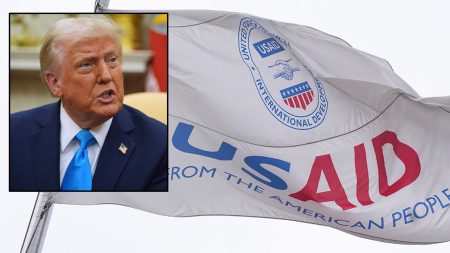The imposition of new tariffs by the Trump administration on goods from Mexico, Canada, and China has sparked a heated debate, with Democrats vehemently warning of increased costs for American consumers and Republicans arguing that the tariffs are necessary to address the fentanyl crisis and encourage changes in trade practices. The White House announced a 25% tariff on all goods from Mexico and Canada, a 10% tariff on Canadian energy, and a 10% tariff on all goods from China, citing an “invasion of illegal fentanyl.” While the tariffs against Mexico and Canada have been temporarily postponed following negotiations, the tariffs on Chinese goods have already taken effect.
Democrats argue that these tariffs will ultimately burden American taxpayers. The Peterson Institute for International Economics, a nonpartisan think tank, projects that these tariffs will cost U.S. households approximately $1,200 annually. Leading Democrats, such as Senate Minority Leader Chuck Schumer, have criticized the tariffs as a “golden age of higher costs” for American families, arguing that they will increase gas prices and inflate the cost of everyday goods, while doing little to effectively combat the fentanyl problem. They propose alternative solutions to address the fentanyl crisis without negatively impacting American consumers. Democratic lawmakers have introduced legislation to increase congressional oversight of tariff implementation, requiring presidential briefings and congressional approval before enacting tariffs on allies or free trade partners.
The proposed legislation, known as the Stopping Tariffs on Allies and Bolstering Legislative Exercise of (STABLE) Trade Policy Act, aims to curtail the president’s authority to unilaterally impose tariffs, particularly on allied nations. Democrats emphasize that tariffs on Mexico and Canada, key trading partners, risk jeopardizing crucial alliances and disrupting established trade relationships. They contend that the tariffs represent a substantial tax increase on working Americans, potentially costing them thousands of dollars annually. Experts predict price increases for various food items, including avocados, dairy products, and certain meats, due to the tariffs, highlighting the potential impact on household budgets.
The impact on specific industries, such as agriculture, is also a concern. The U.S. relies heavily on Canada for imports of hog and beef, and these tariffs are expected to drive up import costs, translating to higher beef and pork prices for consumers. This concern extends to other sectors, underscoring the potential for widespread economic repercussions. Democrats have introduced legislation to restrict the president’s use of emergency powers to implement tariffs, fearing a negative impact on the economy and potential retaliation from affected countries.
While some Republicans acknowledge the potential for increased consumer costs due to the tariffs, they argue that these measures are necessary to address pressing national security and trade concerns. They assert that the tariffs are designed to compel Mexico, Canada, and China to alter their behavior, particularly regarding fentanyl trafficking and unfair trade practices. The White House emphasizes the severity of the fentanyl crisis and justifies the tariffs as a crucial tool in combating the “drug war.” Negotiations with Mexico and Canada have led to temporary postponements and commitments to enhance border security measures.
Mexico has agreed to deploy 10,000 troops to the U.S.-Mexico border, while Canada has announced a $1.3 billion border plan involving increased personnel, technology, and cooperation with the U.S. to combat fentanyl trafficking. While Canada initially threatened retaliatory tariffs on U.S. goods, these have also been temporarily paused during ongoing negotiations. Both countries have pledged to strengthen efforts to combat organized crime, fentanyl trafficking, and money laundering in collaboration with the U.S. The ongoing debate highlights the complex interplay between trade policy, national security concerns, and domestic economic impacts. While the Trump administration maintains that the tariffs are a necessary tool to address critical issues, Democrats continue to express concerns about the potential burden on American consumers and the strain on international relationships. The long-term effects of these tariffs and the effectiveness of the negotiated agreements remain to be seen.










